when it comes to fast fashion, zara is not like other girls
(except when she's exactly like other girls)
QUICK HITS
Okay, not to be a stan, but North West and Kim Kardashian in conversation for Interview Magazine was probably the most fascinating thing I read all day. I always forget how religious the Kardashians are, but then North mentions God about three times in this interview and says that to help people, she spreads the gospel: “Tell them about God, and how problems get solved if they follow his word and his way.” She’s also clearly obsessed with Tyler the Creator, her dad, Japan, and is learning Latin in school. The more you know. I actually really love North’s energy; she’s clearly a born entertainer.
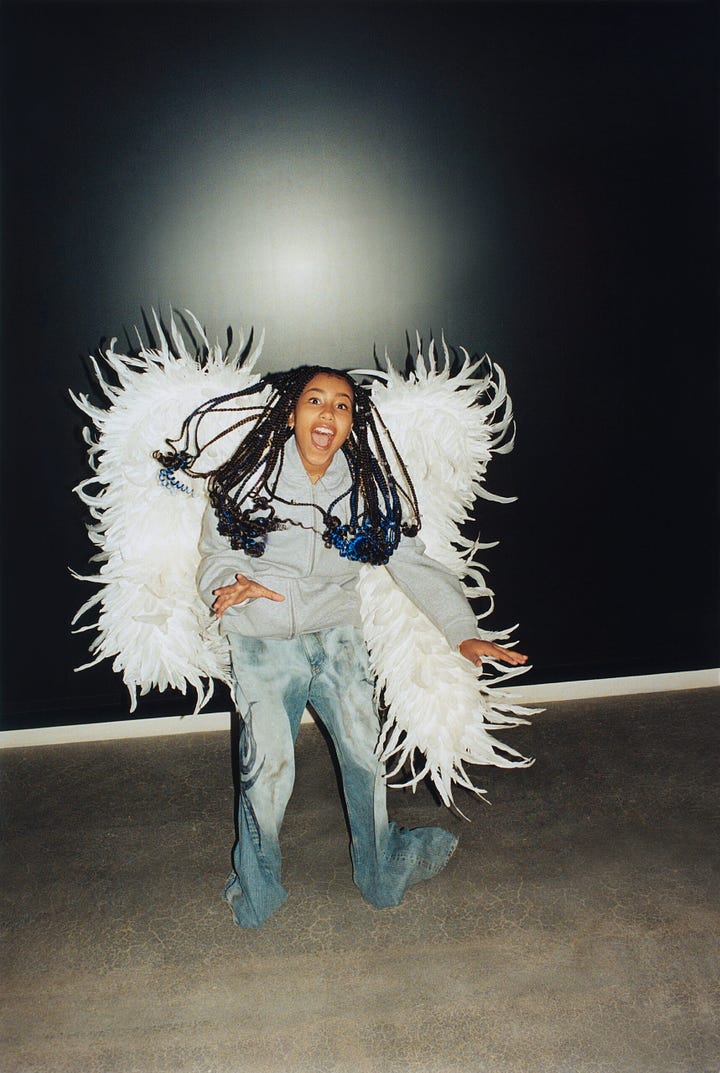

What is Wicked, if not a cash grab for every brand that has Ariana Grande’s talent manager on speed dial? Seriously, I think I’ve heard more talk about Wicked merch than the movie itself. Which, by the way, seems to be following the Barbie playbook in that it has the same release date as Gladiator II (like Barbenheimer) and, of course, all the merch.
Have you checked out Link In Bio’s Q3 Brand Social Trend Report? I contributed to this one with the observation that brand and social professionals are using Substack as their portfolio—in place of a website and as a content feed for LinkedIn. This is actually what I set out to do with as seen on, but it’s clear I’ve lost the plot. Others are finding success, though. I know two people who’ve gotten full-time roles at great brands because of their Substacks. Only yesterday, a friend interviewed for a Head of Brand role at a startup that found her through her Substack, and another told me her Substack provides steady leads for freelance branding gigs. My fave brand/marketing/social Substacks are
, , , and .JPMorgan’s Jamie Dimon says the world is “treacherous and getting worse,” but his bank beat expectations with quarterly profits of $12.9 billion, so the situation can’t be too dire.
Companies are scrapping or rolling back DEI grants because they’re afraid of getting sued, and I guess it was never really that deep? According to an analysis by Skip, an online platform for small business owners, of more than 60 grant programs that in 2023 included race or ethnicity in their criteria, more than 40% no longer exist, and another 27% no longer use race or ethnicity in making awards. Around 30% of the grants continue to use race as a criterion, but those tend to be smaller programs. And I still can’t get over the fact that the Fearless Fund was forced to drop its grant program for Black women because it was “discriminatory.” None of this surprises me, but still.
Anyway, when Wall Street zigs, Anna Wintour zags, because the 2025 Met Gala theme is “Superfine: Tailoring Black Style,” and Pharrell Williams, Colman Domingo, A$AP Rocky, and Lewis Hamilton—a lineup of all Black men—will be the co-chairs. Three things: I'm super stoked, dying to see Musk’s approach, and these tweets had me screaming.
Nothing I love more than writing about the latest LVMH acquisitions, and there’s nothing billionaires love more than buying sports clubs. Paris FC, a second-tier (and I mean this literally) football club, is in the process of being sold off to the Arnault family, which owns LVMH. The terms discussed will give them a 55% stake in the club, with the current majority shareholder, Pierre Ferracci, retaining a 30% stake and Red Bull acquiring 15%. Those who’ve been paying attention would have noticed that every brand is converging towards the idea of lifestyle, and LVMH is no exception here. Part of why I do so much reporting on their acquisitions is to track how they’re doing this. LVMH invested $163 million in this year’s Paris Olympics, and last week, the group signed a 10-year deal with Formula 1 worth potentially $1 billion, replacing Rolex. Sports-is- culture-is-lifestyle and has been a huge part of LVMH’s strategy. What I haven’t mentioned yet, and what I think is super significant, is that Paris FC is a women’s football club. This is going to be fun.
After a five year hiatus, the Victoria Secret Show is coming back next Tuesday, and judging from the promotional videos, I fear it might be a bit rubbish. (Although I really did love the shows, so I hope it’s not).
Saks Global and Authentic Brands Group are joining forces to create Authentic Luxury Group (ALG), a luxury brand incubator focused on growing the luxury and accessible luxury names within Authentic’s portfolio, leveraging Saks' expertise. Saks is in the process of closing its $2.65 billion acquisition of Neiman Marcus (and, with it, Bergdorf Goodman), and once the deal closes, Authentic plans to make a minority investment in Saks Global. Authentic’s portfolio includes high-end brands like Barneys New York, Judith Leiber Couture, Hervé Léger, and Vince. They also own Champion, Reebok, Aéropostale, Forever 21, and Nine West. Barneys, which Authentic bought out of bankruptcy for $271 million in 2019, will be the first brand that the pair will revamp under ALG, with ambitions to roll out several retail locations or in-store shops. Basically, ALG wants to incubate brand growth through strategic licensing agreements and distribution channels across fashion, retail, digital, hospitality, real estate, art, and travel. They aim to create luxury lifestyle brands.
When it comes to fast fashion, Zara is not like other girls. This is one of my favorite topics to discuss; go read about it here. One day—but not today—I’ll have to do an updated deep dive on Zara’s luxury-adjacent strategy. But for now, here are a few interesting things they’ve done in the last month.
First, they tapped former YSL Head Designer Stefano Pilati to create a co-ed capsule collection—50 styles for men and 30 for women, plus shoes and bags—that dropped earlier this month. Gisele Bündchen was the face of the campaign, and in one shot, she’s wearing this vest from the collection that I’m obsessed with but could never buy because I live in Nuremberg.
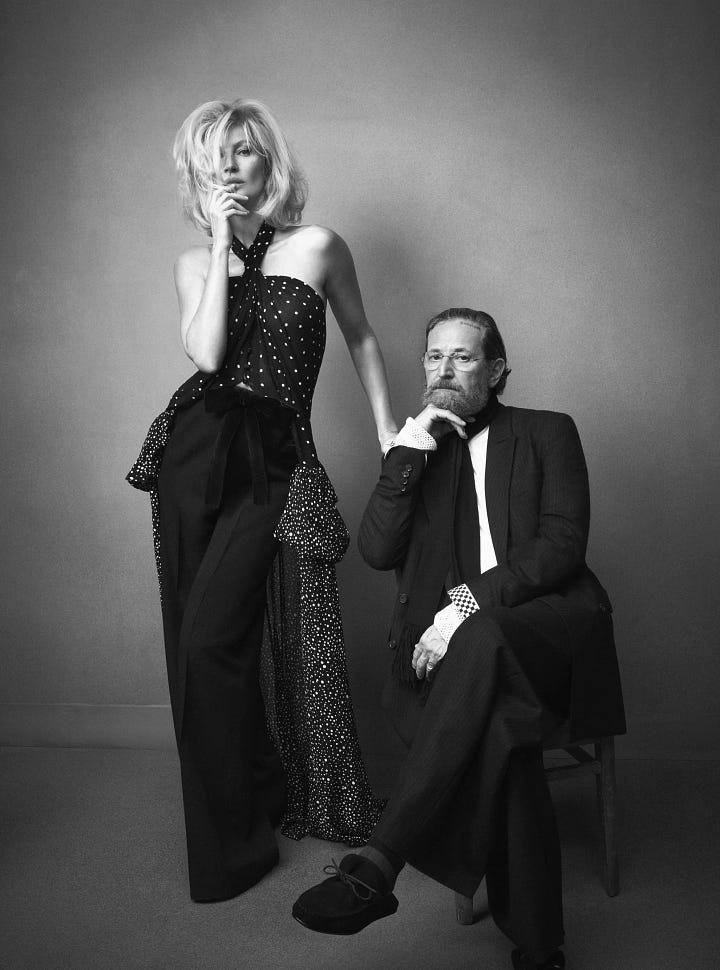
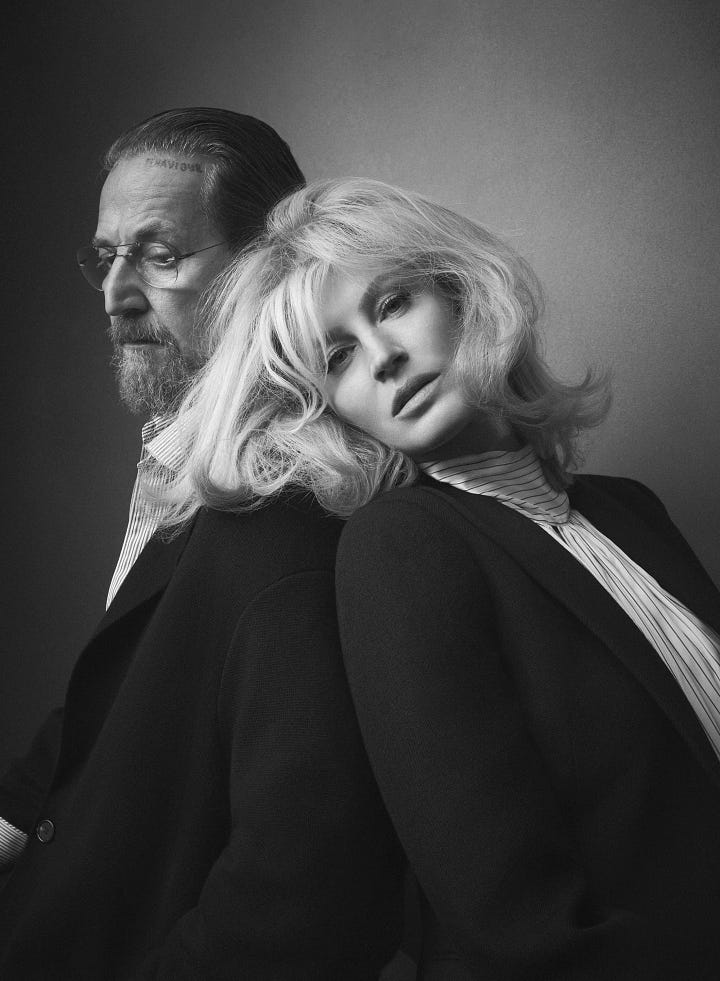
Then came ZaraStreaming, a concept I still don’t fully grasp. Last month, the brand hosted a shopping live stream presented by Cindy Crawford and her daughter Kaia Gerber, who were also featured in this fun 35-minute video. The collection—chic and autumnal—was designed by Carlyne Cerf de Dudzeele, and the video was directed by David Lowery. I think they need to do a better job of educating people on how to engage with their live shopping events, which are huge in Asia but still hit or miss for Western audiences.
Former Virgil Abloh protégé Samuel Ross also recently signed a deal with Zara to create a biannual men's collection, SR_A Engineered by Zara, inspired by SR_A, his newly launched high-end menswear line featuring a made-to-order model. Ross’ previous brand, A-Cold-Wall, made a name for itself with a high-end streetwear offering infused with commentary on the British class system.
And now Kate Moss is working on a party capsule with Zara, featuring ready-to-wear and accessories meant for big nights out, which will be launching next month. All this to say, when it comes to fast fashion, Zara is not like other girls.
Meanwhile, are you even a hot indie fashion brand if you didn’t partner with Gap on a collection this year? Serious question.
Circa 2021, it seemed like every aesthetically inclined girl on my feed with 5 to 10k subscribers was always shilling some discount code or another. Their underwear (Parade), jewelry (Mejuri), sunscreen (Supergoop). Marketers loved these micro and nano influencers because they believed their smaller following made their messaging more authentic. They were also significantly less expensive than celebrities and bigger influencers. But a recent survey of 200 US enterprise marketers by the influencer firm Linqia found that between 2023 and 2024, the share of respondents who said they wanted to work with a celebrity grew from 30% to 40%, and for mega influencers, the share rose from 48% to 60% over the same period. Micro-influencer work as a category dropped from 74% to 62%, while nano-influencer work fell from 37% to 28%. Two major reasons for this shift are that smaller influencers are becoming more expensive, and they don’t drive engagement on TikTok the way larger influencers do. Further proof that the influencer middle class is barely a thing. Please don’t quit your job.
wrote about Gen Z’s love for the ~culture and aesthetics~ of wine—despite drinking less than other generations—for The Times, and I’m here to concur. Here’s what I know: my friends and I, we love natural wine, non-alcoholic wine, wine bars, and wine glasses. Taking pictures of wine bars and wine glasses and feeling grown up in wine bars with our wine glasses. We love to cosplay “wine culture” (dinner parties please!), but we don’t love wine.
Let me say this—and I really do mean what I’m about to say—I find it kind of insane how comfortable beauty brands are with using mental health as a marketing platform. It’s like there’s a playbook that makes its way to every makeup and skincare brand at their inception that reads: Gen Z’s mental health sucks. Add mental health advocacy to brand positioning. Yesterday was World Mental Health Day, and to commemorate, Tower28, a brand I actually like, partnered with Remi Bader on an “It’s Okay To Be Sensitive” lip kit. 100% of sales will be donated to the JED Foundation, which is great, but I also know this is an acquisition tool, and I see this kind of messaging too often to not be irritated by it. It’s also the small things, like how Rare Beauty products are named things like Find Comfort Tinted Clutch or Positive Light Silky Touch Highlighter. There's even a True to Myself Tinted Pressed Finishing Powder and Always an Optimist 4-In-1 Mist. Selena is a billionaire, so obviously, it resonates. Anyway, it is my understanding that when people said “normalize mental health,” this is not what they had in mind.
Charli XCX hosted a listening party for the brat remix album at Storm King Art Center, the upstate New York sculpture park. The event was live-streamed on Twitch. And while I didn’t love the album or think it started some Gen Z nightlife renaissance, Charli did make the summer a lot more fun, and for that, I am grateful.
Archival partnered with Tumblr on this State of Community Report for marketers trying to reach Gen Z. It was interesting, but as I was reading it, I had two somewhat opposing thoughts on my mind. The first is that the more I think about community as it relates to brands—like really think about it—the less I know what any of it means. If we’re being honest, “fandom” is a much better word to describe what a lot of brands and influencers refer to as their communities; it just doesn’t have the same ring to it. There’s something generous about calling your fanbase your community, even though it's not quite accurate. The second thing is that these days, I’m constantly grappling with the reality that, in the West at least, a lot of community is built around brands—companies and influencers and celebrities—in a way that wasn’t the case even a few years ago. The weird thing about the micro-influencer boom was that, at one point, it felt like everyone and their mother was proselytizing some brand. With celebrities and influencers, at least you knew what to expect, but Jenny from BioChem trying to sell you a pair of leggings was just weird. I’m actually a lot less bothered by this than I sound, but only because by now I’m used to it. But when I go back home and interact with communities built around shared cultures, faith, and interests, I do feel the difference. Americans are natural evangelicals, each person with their own god.
The first I heard about Caroline Calloway hunkering down for Hurricane Milton was when my friend sent me this text. I read this interview she did with The New Yorker, and I think she knows what she’s doing. (I think she always knows what she’s doing, tbh.) When asked about a tweet that said dying in a hurricane would be the perfect ending to her narrative, Caroline responded, “Like when Eve Babitz literally set herself on fire. Although I’d like to point out that didn't kill Eve, and this hurricane’s not going to kill me.”
Boomers had Bill Gates, Gen X produced Sergey Brin, and millennials have Elizabeth Holmes (I hope you claim her). Gen Z, apparently, has nobody. As I’ve said before, today and every day, it’s Business Insider vs. Gen Z, but this thought has also crossed my mind once or twice, so I’ll give them a pass for this one. Business Insider blames it on a tough funding market, innovation (except for AI) slowing down in a mostly mature market, and the fact that Gen Z founders are, ironically, more camera-shy. Let me know what you guys think because I’m coming up empty.
I’ll say this about Elon: the man knows how to make an entrance. At the We, Robot event hosted at Warner Bros. Studios in Burbank, California, yesterday, Elon Musk pulled up in the much anticipated Tesla Cybercab (along with a few humanoid Optimus robots). The robotaxis, which will be in production before 2027, have no steering wheel or pedals, Musk said, and will have inductive charging rather than a plug. Each one will cost less than $30,000, but how he plans to bring down the costs is anyone's guess.
Love her or hate her, Lina Khan is probably on your mind—if you run a multibillion-dollar corporation, that is. As Biden’s FTC Chair, Khan has blocked planned mergers from Nvidia, Sanofi, HCA Healthcare, Kroger Co., Illumina, and Lockheed Martin. Yes, she’s also trying to block the Capri and Tapestry merger. Amazon and Meta? Sued for anti-competitive practices. Google? Might get broken up, but no, that’s not her. But I’m kind of a stan because she secured a settlement banning Rite Aid from using facial recognition tech to blacklist shoppers and forced Epic Games to refund hundreds of millions of dollars they allegedly tricked Fortnite players into spending. Lina Khan: billionaires hate her, the people love her. This is a great thread.
I thought Rhode was going to launch a hair product (I even had my commentary ready), but instead, they gave us Barrier Butter, an intensive moisture balm for deep hydration overnight. I’m not mad. A few weeks ago, I speculated about the direction Rhode would go in next. They launched as a skincare brand and found immense success with their merch and color cosmetics. I’ve heard their skincare products are actually superior, but with all the makeup buzz, I wondered if some sort of pivot was imminent. I guess not. 90s supermodel Claudia Schiffer fronts the campaign—she’s also an ambassador—and I have to say, she looks great. All of it looks great. Once again, I’m a simp for Rhode’s marketing. You know I love to see brands work with Gen X women, and I think it makes sense for Rhode because it taps into nostalgia and positions the product as a viable option for older women and diverse skin types. A few people in the comments seemed confused about what Barrier Butter really is. A really thick moisturizer? Yes, and maybe the first Rhode product I’ll actually have to get. It’s been almost 10 years since I left Nigeria, but my skin has never gotten used to the northern hemisphere's dryness. My daily body care routine features a mix of body oil, lotion, and Vaseline. I’m big on hydration, will wither and crack otherwise. The rest of the world is catching on—they call it slugging—and it’s been a thing on TikTok for about a year now, around when Hailey said she started developing the product. Barrier Butter is a lot more fun than Vaseline, so I’m sure the girls will love this.
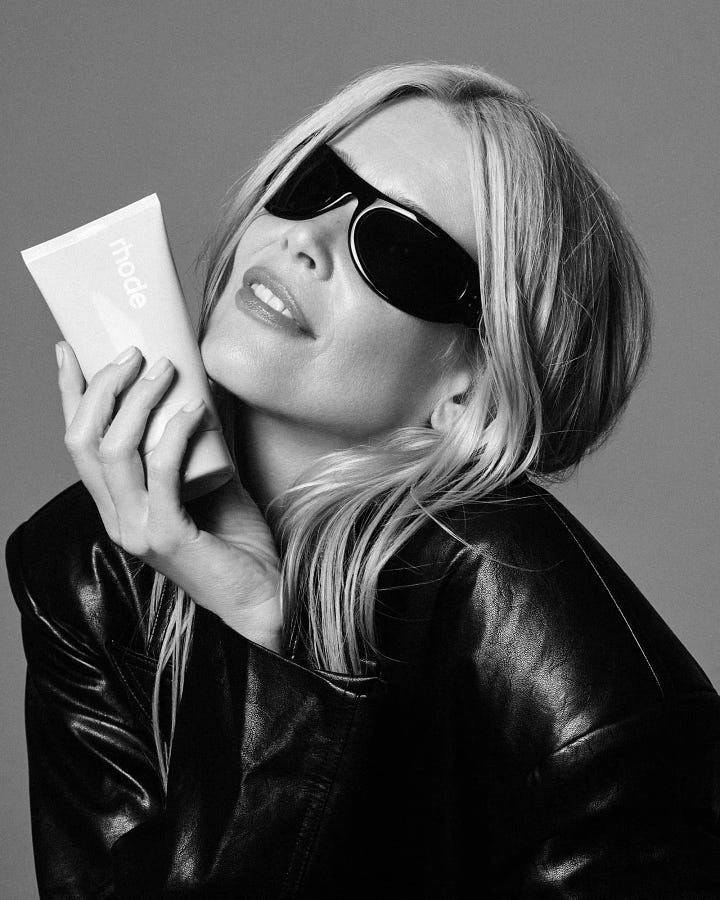
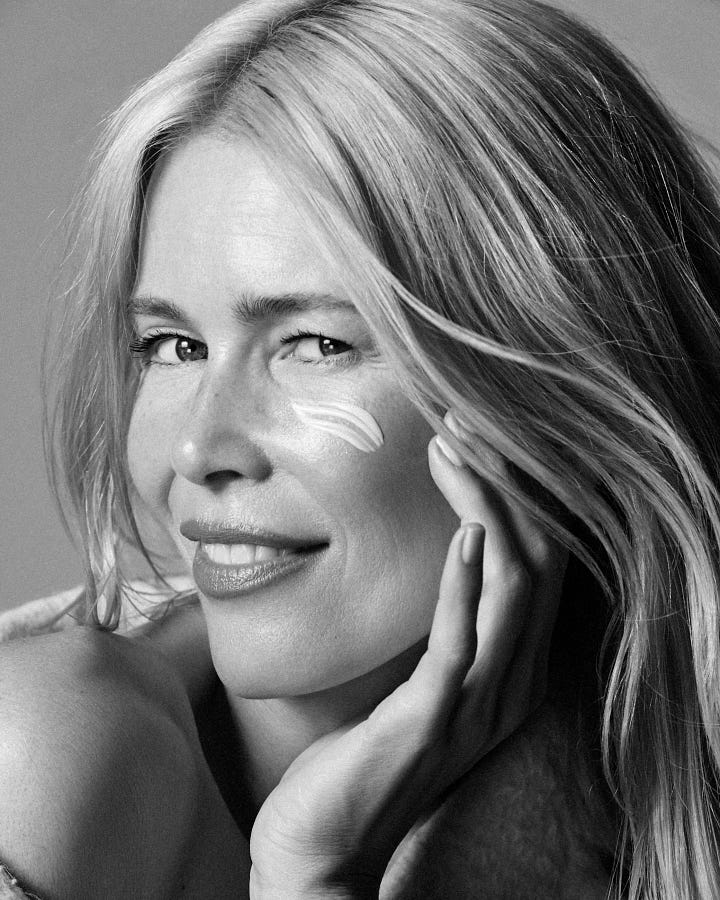
lots of black and white imagery today. this a thing now? If you discovered MERIT today, not knowing who or what they were, you’d be forgiven for thinking it was a fragrance brand—a newly minted one with a surprisingly large number of followers. In anticipation of their first-ever fragrance, MERIT scrapped their Instagram page (as is the habit of brands at any slight provocation), leaving only three cryptic images hinting at a fragrance drop. One of them is a photo dump featuring screenshots from a sponsored post by
, where she describes the fragrance as containing notes of pear, vanilla, bergamot, and rosemary. I love this.Arden wrote this killer essay about how the internet is obsessed with watching pretty (and thin) women eat. “Women who create food content on social media fulfill two of our desires—attractiveness and indulgence. We expect them to stay beautiful, thin, charismatic and youthful. Typical comments sound like I would never be able to eat like that and look like them. But like the female food critics, maybe they don’t. We have no idea what happens when the camera turns off.It’s an impossible situation. You have to be thin, but you can’t ever talk about going on a diet, or taking Ozempic. You must love food and prove that you eat, but you can’t gain weight. You have to be alluring, but not overly sexual. And you can’t admit that you’re under any pressure at all, for that would break the fantasy.” Part II is going to be about how food is no longer food.
In a not so shocking turn of events, WeightWatchers is now selling low-cost Wegovy dupes. Their shares rose as much as 20% when the news broke. You know what they say: if you can’t beat them, join them.




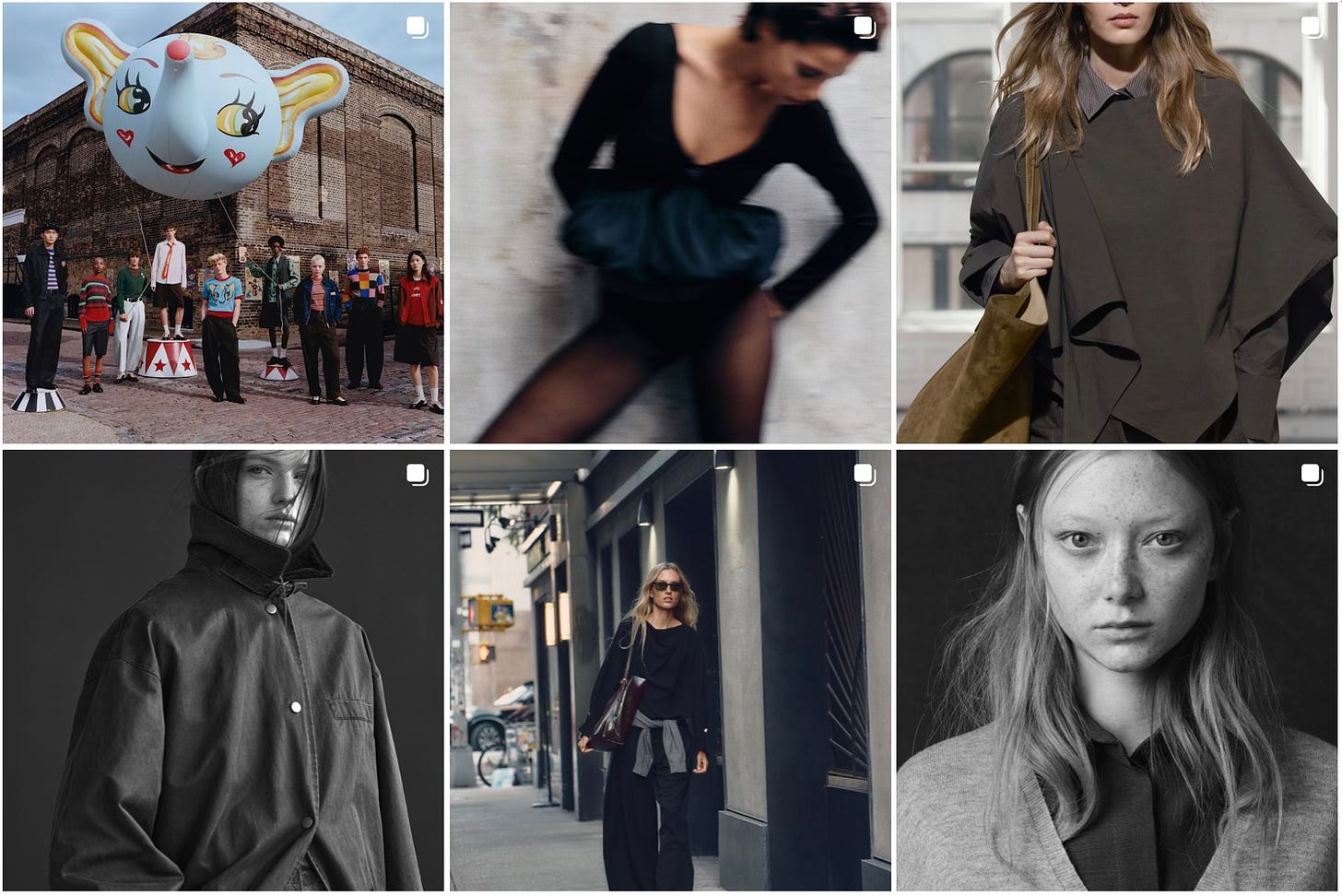

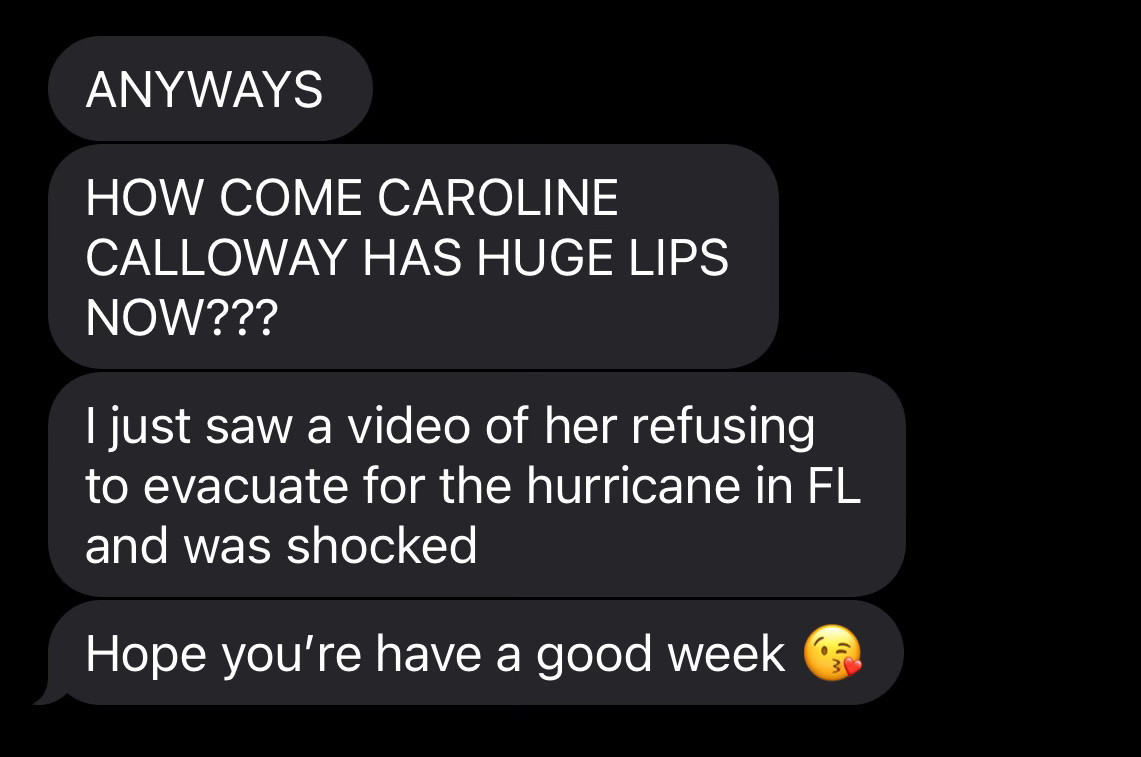
The way that I wish Andre Leon Tally was still alive because he would have *things* to say about this met gala theme and what’s really painful is that if he was still alive and him and Anna were on good terms and she actually let him curate it it would be such an amazing exhibit.
No stanning government figures etcetc, but if I *did*, I'd stan Lina Khan every day of the week.